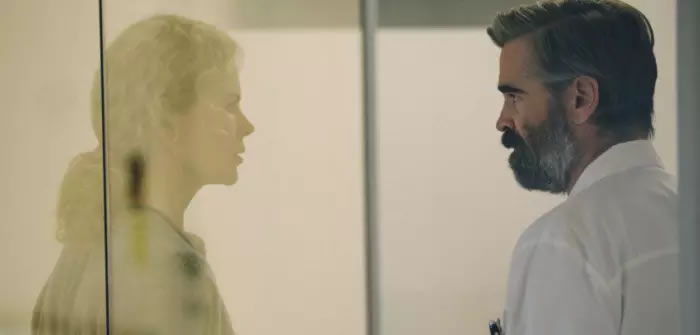Building on the surprising success of his English language debut The Lobster, Greek director Yorgos Lanthimos puts a further deadpan spin on the horror genre with his new film The Killing of a Sacred Deer, a fatalistic and at times morbidly funny tale in which the sins of a father are visited upon his family in bizarre and horrifying ways. A Greek tragedy transplanted to the decorous environs of New York’s bourgeois professional classes, it stars Colin Farrell as Steven Murphy, a heart surgeon with a seemingly picture-perfect life. His wife Anna (Nicole Kidman) is a successful optometrist and their two children – teenage daughter Kim (Raffey Cassidy) and her younger brother Bob (Sunny Suljic) – are polite and respectful, if a little distant from Steven. Indeed, he seems much closer to Martin (Barry Keoghan), a teenager he appears at first to be mentoring, though their relationship has something of a creepy air about it, and not just because of the discomfiting way Lanthimos presents his characters, or the affectless way his cast deliver the intentionally banal dialogue. The expensive gifts Steven furnishes Martin with feel a little inappropriate, and the way he lies about Martin to his colleagues when he turns up unannounced at his work further hints at something rotten beneath the surface. Yet he doesn’t keep his relationship with Martin secret from his wife. Instead, he invites Martin to his home to have dinner with him and Anna. The ever-courteous Martin even ends up befriending their kids, Kim in particular. Still, as Lanthimos gradually reveals the exact nature of their relationship, the sense of impending doom intensifies accordingly, like the growth of a malignant tumour plotted over successive X-rays.
This starts to happen when Steven and Anna’s youngest falls prey to a mysterious illness for which there’s no medical explanation. Then it starts happening to Kim and all of a sudden Steven – whose professional foibles are hinted at in oblique conversations with Anna – has to take seriously the terrible dilemma Martin has presented him with, the titular significance of which is underscored by a minor character’s mention of the myth of Iphigenia. Which isn’t to imply that understanding the film is dependant on an intimate knowledge of Greek mythology. Lanthimos – who wove thematically relevant references to Rocky and Flashdance into Dogtooth – also throws in a few nods to Groundhog Day to underscore the existential crisis facing Steven as his options rapidly start to run out. The story itself is also rather straightforward, no more complex than movies like Cape Fear or Fatal Attraction or any number of Stephen King stories in which a malevolent outsider wreaks havoc on a family for perceived wrong-doing. What makes it fascinating is the way Lanthimos reinterprets this type of filmmaking and storytelling, stripping it of melodrama, yet transforming its everyday setting into an unsettling, sci-fi-like reality. Everyone in the film talks and acts as if they’re in a remake of Invasion of the Body Snatchers (which of course Kidman once was in The Invasion). Their speech patterns and conversational topics are all off-kilter, but the suppressed emotions behind their words are unmistakable, thanks largely to the brilliant work of Kidman and Farrell – both at the top of their game – and Keoghan, who’s magnificently creepy as Martin. But the film’s Brechtian distancing effect also feels like a satire of fellow art house provocateur Michael Haneke, whose films – especially Hidden – explore similar themes, and whose bourgeois characters are often so severe they can sometimes come across as comically inhuman. It’s a little harder to tell if Lanthimos is being satirical or sincere in his homages to Kubrick. The way his camera drifts through symmetrical hospital wards; the unsettling perfection of his framing; the disruptive use of classical music – it all suggests a filmmaker in thrall to The Shining and there’s something about the way Farrell’s character is trapped in this nightmare of his own making that echoes the fatalistic nature of that horror classic. But make no mistake: this also very much of a piece with Lanthimos’s previous work and in boldly upping the scale, it further confirms him as one of the most distinctive voices currently working.
Like Lanthimos, Norwegian director Joachim Trier (Reprise, Oslo, August 31st) has also been one of the rising stars of world cinema over the last few years, albeit one who’s yet to have a true crossover art-house success. His latest is unlikely to deliver that either. That’s not because Thelma lacks commercial appeal. Indeed, marking Trier’s first foray into supernatural horror, it’s arguably his most accessible film to date. It’s just not particularly good. It does start off strongly, though, with the provocative image of a man marching his young daughter into snowbound woods and, momentarily, putting a gun to her head. That child grows up to be the eponymous Thelma (Elli Harboe), whom we rejoin as she’s starting university, her status as a somewhat sheltered, Christian-raised teetotaller making her something of an outsider, especially when surrounded by horny teenagers living away from home for the first time. When she falls for classmate Anja (Kaya Wilkins), however, her ensuing coming-of-age/coming-out crisis manifests itself in a full-on Carrie-style meltdown, her secret desires awakening long-buried telekinetic abilities. Unfortunately Trier keeps changing the rules of the world, engineering a far more optimistic ending than material can really bear. ■

